THE OFFICE of the Civil Defense Davao (OCD XI) said that extending the suspension of classes and skeletal workforce setup is necessary to strengthen rapid disaster needs assessment (RDNA) and ensure public safety.
OCD XI regional director Ednar G. Dayanghirang said the region continues to be battered by a series of aftershocks, which might not be felt by the public. These further weaken structures that were already damaged by the recent earthquake.
Dayanghirang said OCD is intensifying the RDNA with the local government units, particularly in the northern part of the region.
“My message to them (local chief executives) is that on Monday (Dec 4), they make sure that schools are 100% safe, so they took it as a guide to act on suspending the classes,” he said during the Habi at Kape Media Forum, Dec. 6.
“You cannot do RDNA in one day if you are really diligent in inspecting structures and schools, given the fact that there are still aftershocks,” Dayanghirang added.
The defense chief lauded the local chief executives in the region for immediately suspending classes and onsite work to prioritize the safety of their constituents.
The OCD XI Regional Disaster Risk Reduction Management Council downgraded the alert status from red alert to blue alert effective 8 a.m. on Dec. 6.
“The OCD-RDRRMC XI EOC shall continue to monitor the effects of the Magnitude 7.4 Earthquake in Hinatuan, Surigao del Sur and other related incidents and shall continue coordinating with the appropriate agencies and local government units for any possible response interventions,” the advisory reads.
With the downgrade, the defense chief said chances are the situation will go back to normal within a few days, and the alert will downgrade to White status.
At present, the monitoring and inspection in local government units is already 80% complete.
More local approaches needed
The director emphasized the need to reach and capacitate the people to develop a sense of resilience as they tend to get overwhelmed by fear when disaster happens.
Disaster drills, oftentimes become selective, focusing only the government offices and schools where most of the people in the community are excluded.
“We have to do a lot more to reach the people, to capacitate the people, to provide more drills in the puroks and barangays, household level drills,” Dayanghirang added.
The defense chief said they are devising a program to enhance communication of disaster resiliency messages, including but not limited to prevention, mitigation, preparedness, response, and rehabilitation/ recovery.
These messages shall be translated into the native tongue and into indigenous peoples’ dialect to ensure these come through to every Davaoeño. Dayanghirang said these shall be transformed into video clips, and audio clips and be posted on social media platforms.
He urged the local chief executives to make use of community radio stations to broadcast these messages repetitively and use all available technologies in the locality to reach more people.


